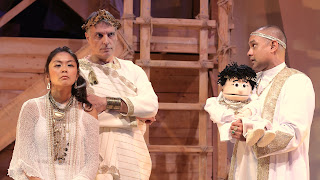Theater Review: A Strange Shaw Treatment of “Caesar and Cleopatra”
Caesar and Cleopatra
Written by George Bernard Shaw
Directed by David Staller
Starring Brenda
Braxton, Robert Cuccioli and Teresa Avia Lim
Gingold Theater Group
Theater Row, Manhattan
October 8, 2019
Caesar and Cleopatra, written in 1898 by British
playwright George Bernard Shaw (1856-1950), is a strange duck. It feels like a
prelude to his more famous Pygmalion (the My Fair Lady
inspiration) from fifteen years later. This one feels like it will plumb
familiar Shakespearean ground, with Caesar arriving in Egypt to supervise his unruly
territory and meeting the teenaged Cleopatra. The unusual spin is that it becomes
a play about mentorship, rather like Pygmalion, in which an older man
helps a girl/young woman mature and “flower”. The play would have been a hot topic in 1898 as Great Britten
wrestled with the financial and moral consequences of imperialistic empire
building. But Shaw does not really show much interest in such moral quandaries,
other than describing rebellious Egyptians. He is strangely interested in
details of Caesar’s governance and military actions in Egypt. Why? Also odd, and a bit like Henry Higgins (at least for most of Pygmalion), Caesar shows amazing restraint--the middle-aged Caesar does not sleep, or even seem very attracted to, the voluptuous Queen of Egypt. This comes
across as oddly prudish, and contributes to the ambiance of the whole thing as a history play with not quite enough character development--certainly not enough to rise to
the level of Shakespeare’s history plays.
This may explain the adaptation by David Staller, vastly
expanding the role of Ftatateeta, Cleopatra’s slave-nurse-guardian.
This adaptation gives her the most lines, makes her the lead narrator
(including bantering with the audience, not very 1898), and has her appear in nearly
every scene. This fits in the 2019 theater paradigm of portraying strong black
people, in particular showing how even slaves had strength and importance. Brenda
Braxton as Ftatateeta was memorably strong, funny, and a bit domineering. Thinking
about this play a week later, it’s even a little hard to remember much about the
other characters, including the title characters. Maybe this is Shaw’s problem,
maybe the director/actors’. But in increasing her role, the adapter has thrown
off the balance of the play. The audience now has to deal with the history of
Caesar, the development of the Caesar-Cleopatra relationship, and the
evolution of Ftatateeta. The play now lacks focus, and seems a grab bag of
elements. I have not seen the original, and perhaps it is equally unfocused,
but I doubt it…Shaw is a pretty good playwright. A directorial choice that I did like was the
transformation of the not-yet-ready-for-prime-time child-king Ptolemy into a
hand puppet--this which would have amused Shaw, I think.
Overall this adaptation of a little-seen Victorian
era play as a 2019 black empowerment play, while well-intentioned, was unsuccessful.
While I think that updates of dated older plays can be interesting and even revelatory
(witness the recent Oklahoma redo), such revisions can harm the original
or create audience befuddlement. I think that’s what happened here.

Comments
Post a Comment